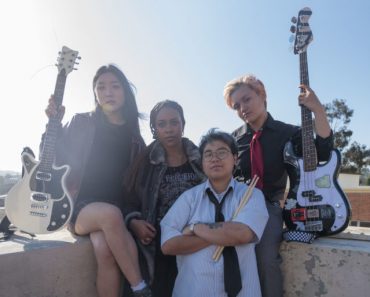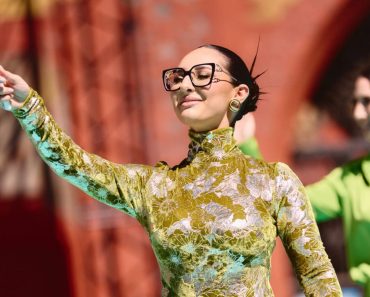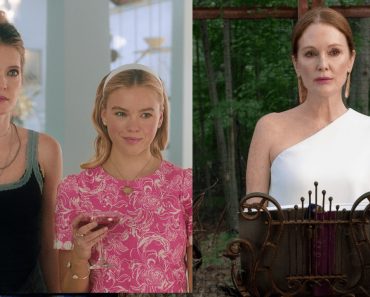[This story contains spoilers from the first two episodes of Netflix’s Sirens.]
Perhaps the sirens came calling for director Nicole Kassell.
Before signing on to direct the first two episodes of Netflix’s limited series Sirens, Kassell recalls, ”I read that script, and it just knocked my socks off.”
The script was Molly Smith Metzler’s story that follows Devon (played by Meghann Fahy), who ventures to a lavish island to confront her younger sister Simone (Milly Alcock) and ask her to come back home to Buffalo to help with their ailing father (Bill Camp). However, Devon is caught off-guard when she realizes her sister is no longer the woman she once knew and now works for socialite Michaela “Kiki” Kell (Julianne Moore), who not only reigns supreme on the island and its community but has a tight knit bond with Simone.
Already familiar with Greek mythology and once an art history major, Kassell, who also exec produced the show, was all for exploring the series’ strong tie to Greek mythology but with a new angle given the stories are usually “told from a male perspective.”
“I love the idea of analyzing the idea of what a siren is, and who says what a siren is — the sailor. It’s very fun to get to go back and consider it from a female lens,” she tells The Hollywood Reporter.
When signing on, Kassell was devoted to incorporating Easter eggs throughout to lean into the Greek mythology visually, from the Cliff House location to props, costume design — yes, everyone really was dressed like an “Easter Egg” as Fahy’s Devon points in the series — and a score that could let the audience hear a woman humming.
“The idea is sirens live on a rocky island and call to their sailors so that aesthetic was essential. It really is a symbolism of class status, that the wealth lauds over all other beings,” she says of the series’ prominent Cliff House location.
Ahead of the show’s premiere, Kassell spoke with THR about directing the series’ first two episodes, whether the Cliff House and community are a cult, Moore’s shattered reunion with the bird Barnaby and the important questions viewers should be asking themselves.
What were your first thoughts when you learned about this project?
I read that script, and it just knocked my socks off. It was a little weird and funny and also deeply touching and I could tell that it was hitting on some really important issues and emotions. I had a couple conversations with Molly [Smith Metzler], and then came back to her with what my was in my mind’s eye, because I feel it’s essential to not only be able to talk about as a director, but to be able to show you what I see, because what I see is what you’ll get. And by showing images and talking about music, it just makes it very specific. This is the tone, and this is the visual world in which I see this taking place.
Sirens heavily leans into Greek mythology. How familiar were you with Greek mythology? How did you go about tying that into your work on these episodes and making references?
I am aware of Greek mythology. I have a daughter and my son, they all went through their Percy Jackson phase. And I’m involved in a project based on Medusa, went to Greece last year, so the timing was right. I love the idea of analyzing the idea of what a siren is, and who says what a siren is — the sailor. The thing with Greek mythology is that all those stories were told from a male perspective. So it’s very fun to get to go back and consider it from a female lens. And so what I did outside of the writing was I worked with the production designer and the costume designer and the props to lean into Greek mythology visually. That first outfit that Julianne Moore wears, there’s nothing practical about it, but she was described as a goddess, [and] instantly that vision came to mind. And so with the costume designer, we kind of looked at the classical goddess, materials and flow and that ancient Greek aesthetic. In production design, we also had the idea of this island but [also] little pieces of decor like the harp in the setting for episode two. Those are the Easter eggs we had so much fun crafting.
One of the things I asked for very early on in pre-production, having read the script, was I just felt like it could be amazing in some of these moments to hear a woman humming, to hear Michaela humming or each of the sirens at different points. So we asked a composer to create a melody or theme that Julianne Moore could hum, and that we could then build score in and out of, that was so exciting. And [composer] Michael Abels came back with this theme song that just rocked our worlds, and Julianne [Moore] was amazing and studied it. And so something we really utilized in the sound design was the idea of the female voice and our actual actors.
In the first episode we see Devon and the fruit basket travel to see her sister Simone at the Cliff House and what’s quickly notable is the color contrast. She asks Simone why everyone looks like an Easter egg so I want to ask the question to you as well. Why does everyone look like an Easter egg and can you talk about the color contrast of this world that Devon has suddenly entered?
In terms of palette, we knew Devon came from Buffalo and that it’s a kind of lower working-class, poor neighborhood and then she experiences culture shock when she walks into this island. And someone may feel that way if they went to present day Nantucket or Martha’s Vineyard. I’m not going to point fingers, but we really just took inspiration from a culture that does exist and we heightened it. But the idea of Nantucket red is truly a color, and it’s not red, it’s pink, but a very specific shade of pink. I think we all kind of have that feeling when we go somewhere new [and] where there’s kind of a uniform of the aesthetic. We wanted this island to have that in spades. Michaela kind of lives above the rules, but everybody else has to adhere to those rules, or they really stand out. Simone is like the student of it and wears it meticulously and judges it and analyzes it. But we were building a culture of the island, and the fish out of water story for Devon. So she had to be in extreme contrast to it.

Macall Polay/Netflix
Speaking of color contrast, there’s also a moment later on when Devon decides to wear a red dress, which makes her stick out. I saw it as her being a red herring to the world but was there anything symbolic with that look?
We spent a lot of time debating that dress because we saw it, and we’re like, “That’s it. It’s amazing.” But the question was would it be sold in that store? And we decided it would, because red and blue are very much of the nautical world. But, of course, Devon would choose the most extreme, pushing the envelope item in that store. She hones right in on it. In a world of pastel, Devin goes to that delicious blood red.
The Cliff House is the center of this universe, and we also see these intense stairs leading up to it. Can you talk about that location and the meaning behind it?
Well, most important to finding that location was that staircase. That’s a real staircase. That symbolism was so important to Molly, that everything about this world is people social climbing and class and status. So we started by looking for a house on a cliff with a gigantic staircase. And when we found it, we couldn’t believe it. We had to enhance it a bit, but that layout was truly there. The idea is sirens live on a rocky island and call to their sailors so that aesthetic was essential. It really is a symbolism of class status, that the wealth lauds over all other beings.
Simone is shown to be this superstar assistant to Michaela and has a rather unusually close bond with her boss. It’s worth noting that a lot of the times when showing their interactions, there’s always an uncomfortable close-up of their faces. Was that intentional? Michaela is also shown a lot through reflections.
It definitely meant something for me that extreme close-up. The first time we use it is when we see how Michaela kind of sirens Simone. Michaela says, “What would I do without you?” And Simone says, “Find another assistant.” Michaela says, “No, I could never live without you.” It’s to kind of try and put the viewer in the recipient shoes of what it feels like to be looked at by this woman, and it’s so enticing and seductive. And that came from a very concrete homage to Jonathan Demme. He uses that device a lot in Silence of the Lambs and Anthony Hopkins is kind of having an effect upon Jodie Foster. So that was a very specific device we decided early on in the pilot and then in repeated key moments when one might be calling the other in or seducing the other.
And then the mirror, I just love reflections. It’s not just for a pretty picture, but the symbolism of presenting one exterior, and [asking] who’s the true person? Do we ever see the true person? And this world in which so much is about your presentation and kind of the superficial representation and beauty, the status that comes from beauty and privilege comes in different forms. Just really leaning into that idea of the fabricated self versus your authentic self. Each of these characters have moments where you get to look behind the curtains and see their raw self, but a lot otherwise is the presentation.
Well speaking of a fabricated self, Devon describes Simone as a “traumatized little girl trying to run from her past.” Though Simone keeps insisting she is happy in her new life and she wants to stay, what did you make of that? Is Simone trying to run from her past like Devon says or trying to bring her back to it?
I love that question, and I hope that is the question people are asking when they finish watching the show. We come into the show through Devon. She’s our eyes into the world. We believe her in the beginning. But I think there’s a really fascinating shift to when you start to understand Simone’s point of view, like, oh this may be 100 percent valid. I think what’s an interesting question is who’s being the most honest with themselves? Devon just thinks Simone’s drunk the Kool-Aid but maybe Simone’s the most lucid out of everyone. She is very concrete, [says] “I cannot go back. These are the prices I’m willing to pay.” It’s a very beautiful surprise when you see Devon’s motive, that moment of realization that it does serve her keeping Simone in a dependent place and not wanting to be alone in Buffalo. What I find so exquisite about this piece is that they each have a moment of self revelation, self awareness. So with whatever they choose at the end, it’s an active choice. It’s owning that they’re not victims, none of them. They all come from trauma, but they are no longer living as victims. They are choosing to be how they are in the world.
In episode two, we start to see this battle with Devon and Michaela over their bonds with Simone. Can you talk about exploring that dynamic between the three of them? Is it protectiveness over Simone or reflecting of their egos of wanting to be right and the one Simone favors?
I think Devon truly believes Simone drunk the Kool-Aid, because she is so different. You can imagine a Simone that looked a lot more like Devon, rough around the edges, tattooed. But to show up and see your sister in a hot pink, girly dress with perfect blonde [hair] and a nose job? That’s truly upsetting, because it’s like, where’s my sister? Rather than understand it as a rejection of her, she [Devon] has to believe that she’s just been manipulated into a cult. From Kiki’s point of view, she is a caretaker, and her life’s work now is to take in wounded birds and to rehabilitate them. I think she genuinely has had this closeness with Simone over the past year. It’s not a mother-daughter [relationship], it’s more a sister-sister. She’s built this beautiful friendship with this young woman and Devon is revealing cracks, and what she thought it was. It’s very painful to Michaela, because you think you know someone inside out, and then you realize they’re keeping secrets and that’s heartbreaking.

Macall Polay/Netflix
The first episode’s bookends are of Michaela letting her bird Barnaby free, but then the episode ends with Barnaby coming back and shattering her window. Can you talk about that moment and what you wanted it to represent?
That’s the moment of the siren song. So we open with Michaela releasing this bird and it’s beautiful, majestic and strange. We learn how much that bird meant to her. And then at the end, there’s this montage of the three women. And throughout the episode, we know that Michaela is longing for her husband. She’s wanting him to come home. We see her go out on the cliff at night, and she’s standing there and we hear the humming that is meant to be, “Come home to me.” She’s starting to suspect that he’s with someone else. So, in my mind, she’s called to Peter, but in his place, it’s evoked the wrong animal. And the bird has come come back because it’s too dependent on her and it’s symbolic of the danger of the siren song.
In episode two we’re introduced to Kevin Bacon’s character Peter and on the surface he seems like the more approachable easy-going person when compared to Michaela, yet there are moments where he is also secretive and makes you uneasy. Can you talk about who Peter is and what he represents in the Greek mythology of it all?
Well, he’s definitely a sailor but the wealthiest sailor. (Laughs.) It speaks to when someone’s kind of born of that work class. He’s from this wealthy world and then taken his wealth and quadrupled it or more, so just by inherent attitude towards wealth, when he walks into the room, he’s the most important person in the room, whether or not he even knows that. That’s how the world responds to him. He can wear his Crocs and old shorts and sweater, but he can’t shed the wealth that is in his DNA. He has all the trappings of a really nice guy. He’s polite to the staff and loyal to Jose and polite to Simone, but he gets what he wants, whatever it is that he wants.
In episode two, we see Simone having a panic attack and Devon comforting her. It seemed to be the moment we see Simone essentially show the part she’s hiding from everyone.
It’s just a gut-wrenching moment. That moment did so many things at once. It filled in the history of closeness. I just love when a line of dialogue or a look between actors just tells me 20 years of history. The pain of the anxiety attack and the relief that your sister’s there and what would Simone do without Devon? But then, when Simone says, later, “I’m having a panic attack because of you.” Unconsciously, is Devon manipulating things so she can feel the hero she wants to be? There’s a part of her that always needs to be needed.
Devon also has her own personal struggles. We see her struggle with alcoholism, and it seems like every time she wants to drink or smoke she resorts to intimacy. There’s also an uncomfortable moment when she licks Jose. Why does she do that?
She’s definitely an alcoholic, but in her attempt to treat her alcoholism, another addiction is filling its place: a potential, compulsive sexual addiction. So that’s really what that is. Not the best choice. There’s this moment where this man has been kind to her, and I think it’s a very impulsive choice. She is very good at being seductive. So I think what I love about that moment is just how instantly she’s mortified. It’s a symptom of her compulsion.

Courtesy of Netflix
With the title Sirens we think of mermaids but in the series we see it’s an SOS signal between Devon and Simone. Can you talk about the meaning behind the show title?
I think that for me, kind of metaphorically, it’s exactly that of the Greek mythology and the idea of beautiful women having a beautiful song that draws sailors to their crash on the rocks and their death, their demise. I hope people are asking themselves, are these women actually the sirens or are the men the sirens? It is definitely also a reference to this SOS call between the sisters that in our mind they established when Simone was a little girl. If ever she needed anything, [she could] just text Devon that and she’d be right there. And as they got older, it became something that went both ways, and Simone not heeding the call is what triggers the whole weekend’s events.
In the first episodes Devon becomes more determined to take Simone home when she hears rumors that the Cliff House establishment is a cult. What did you think of that perspective that the Cliff House and people is all a cult?
As a filmmaker, I wanted to lean into the cult because it’s so fun and so strange. Personally, did I ever think it was actually a cult? No. But I loved through Devon’s eyes why she could see it as that. I think it’s also making a comment on cults being trendy. There’s been a lot around cult attention or the idea that a character might think it was cool to have been part of a cult. It’s those moments that I love that are commenting on our culture as a whole. It’s within the story, but it’s a bigger commentary.
***
The full first season of Sirens is streaming now on Netflix.







